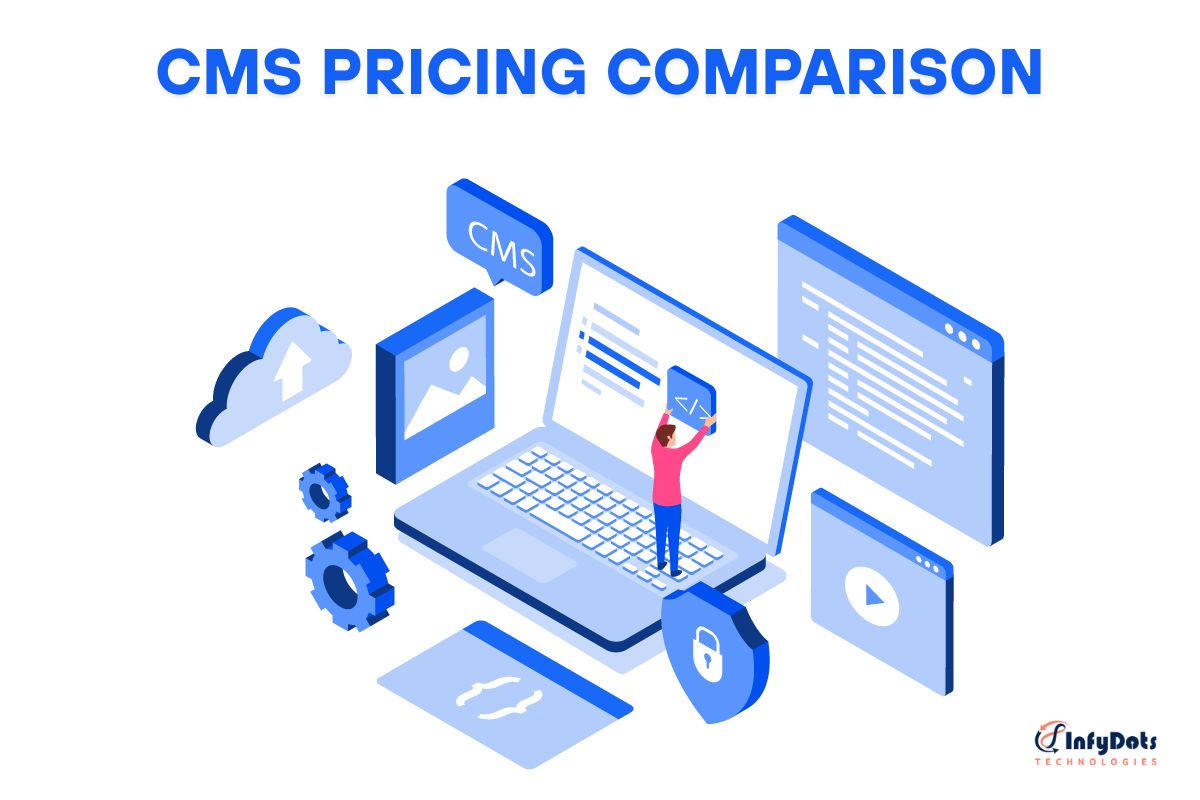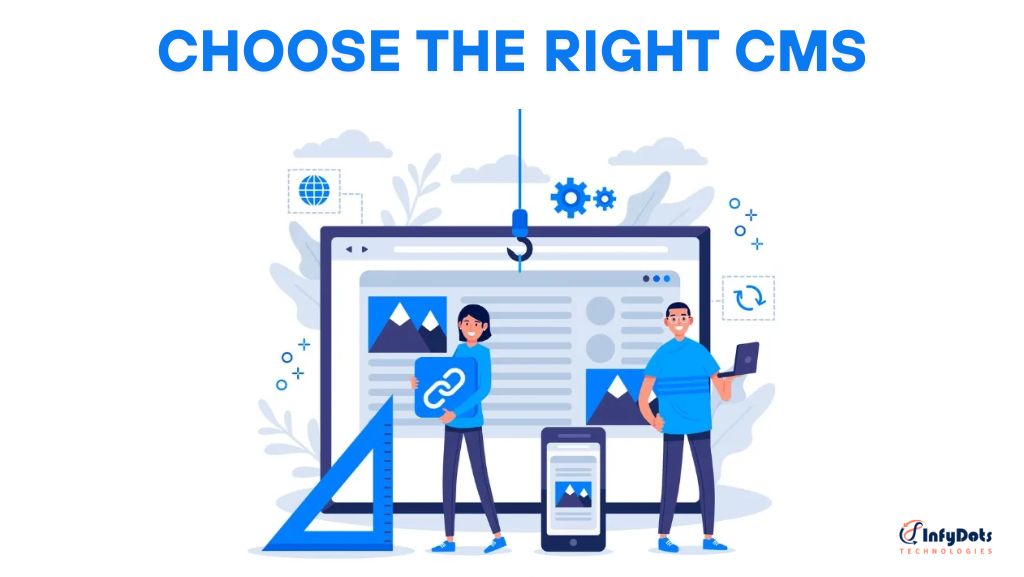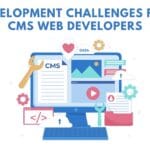💰 CMS Web Development Pricing Breakdown
When planning a content management system (CMS) for your business, the most common question is: How much does CMS web development cost? In this comprehensive guide, we break down the factors influencing the pricing of CMS development services, helping you make informed decisions when working with a CMS development company.
🔍 What is CMS Web Development?
CMS web development is the process of building and managing websites using a content management system like WordPress, Drupal, Joomla, or a custom-built CMS. It empowers businesses to easily manage website content, publish blogs, and add new features without advanced coding knowledge. Choosing the right CMS development services can streamline your content workflow and save time and cost in the long run.

🧮 Key Cost Factors That Influence Content Management System’s Cost
The total investment in CMS web development can vary significantly based on several technical and business-driven factors. Whether you choose a custom solution or an off-the-shelf platform, each element plays a vital role in shaping your final budget. A reputable CMS development company will help you assess these variables before starting your project.
🔧 1. Type of CMS (Open-Source vs Custom-Built)
Choosing between an open-source platform like WordPress or Joomla, and a fully custom CMS will affect your budget drastically. Open-source CMS platforms reduce licensing costs but might require premium plugins or themes, whereas a custom CMS demands more development hours and cost.
🎨 2. Design Complexity
Custom UI/UX designs, animations, and advanced front-end features add to both development time and cost. A CMS that needs pixel-perfect branding and unique interface components will likely cost more than a basic theme-based site.
🔌 3. Third-Party Integrations
Integrating payment gateways, marketing tools (like HubSpot), CRMs (like Salesforce), or ERP systems can be complex and drive up pricing. These integrations require API work, testing, and maintenance support.
🧩 4. Plugin & Extension Development
Using pre-built plugins saves time, but in many cases, businesses need custom-developed extensions or modules to support unique functionalities. This requires specialized CMS development services and can impact your overall budget.
📈 5. Scalability Requirements
If your website is expected to grow in terms of traffic, users, or features, developers need to build a CMS that’s scalable. That means additional investment in architecture, hosting, and modular codebase development.
🔐 6. Security Measures
Security isn’t optional. Adding firewalls, anti-bot protections, user-role permissions, data encryption, and GDPR compliance can increase your cost, but it’s essential for enterprise-grade CMS platforms.
🔄 7. Maintenance & Support
Post-launch CMS support is critical. Whether it’s regular backups, plugin updates, troubleshooting, or version upgrades—these recurring services are often bundled as annual maintenance packages by your CMS development company.
🧑💻 8. Expertise of the CMS Web Developer
Hiring a skilled CMS web developer affects cost. Experienced developers may charge higher rates but deliver optimized, secure, and maintainable CMS solutions that save money in the long run.
When estimating the budget for CMS development services, it’s vital to consider all of the above elements. Transparent discussions with your development partner, like Infydots Technologies, will ensure you invest wisely and efficiently in your digital platform.

💸 CMS Pricing Comparison: What You Get for Your Money
Understanding the real value behind CMS pricing is essential when planning your cms web development project. While cost is a major factor, the level of features, security, scalability, and long-term support varies significantly based on your budget and choice of CMS development company.
Here’s a detailed comparison to help you evaluate what you can expect at different investment levels when choosing cms development services:
| Pricing Tier | Estimated Cost | What You Get |
|---|---|---|
| Basic CMS Package | $5,000 – $1,500 | Standard CMS like WordPress or Joomla setup, basic theme customization, essential plugins, mobile responsiveness, and initial SEO setup. |
| Mid-Tier CMS Package | $1,500 – $5,000 | Advanced design customization, custom plugin/module development, third-party integrations (e.g., CRM, payment gateway), security optimization, and limited support. |
| Enterprise CMS Solution | $5,000+ | Full-scale custom development, multisite/multilingual setup, enterprise-grade security, performance optimization, ongoing support, analytics integration, and custom CMS frameworks. |
Ultimately, investing more in a reliable cms development company offers better ROI by providing scalable solutions, reduced downtime, and expert support. Whether you’re a startup or an enterprise, understanding the pricing tiers helps you align your budget with your digital goals.
💸 Hidden Costs to Watch Out For
While most businesses budget for the upfront development cost, they often overlook several hidden expenses that can significantly impact the total cost of a CMS web development project. To avoid budget overruns, it’s essential to factor in these often-forgotten elements:
- 🔄 Ongoing Maintenance & Updates: CMS platforms like WordPress require regular updates to core files, plugins, and themes to maintain security and performance.
- 🛡️ Security Enhancements: Premium security plugins, SSL certificates, and malware protection may incur recurring costs if not included in your original package.
- 🚀 Performance Optimization: Tools for caching, CDN services, and image compression are often billed separately.
- 🧩 Premium Plugins & Add-ons: Some essential features require paid plugins that are not always covered in your initial quote from a CMS development company.
- 💬 Technical Support: Ongoing support plans may cost extra, especially if you need priority or 24/7 assistance from your CMS web developer.
- 🌐 Hosting & Domain Renewal: Many CMS projects exclude hosting and domain fees, which are annual expenses you must budget for.
- 📈 SEO & Analytics Tools: Advanced SEO plugins, heatmaps, and analytics dashboards can be valuable but may require subscription-based pricing.
💡 Pro Tip: When choosing a CMS development company, always request a clear breakdown of inclusions and exclusions to avoid unexpected charges down the road.

💼 How to Choose the Right CMS for Your Budget
One of the most critical decisions during your CMS web development journey is selecting the right platform that aligns with your budget and business goals. With a range of options available—from open-source CMS platforms like WordPress to enterprise-grade systems like Sitecore or Adobe Experience Manager—each comes with its own pricing structure, scalability, and maintenance demands.
🆓 Open Source CMS (e.g., WordPress, Joomla, Drupal)
Perfect for small to mid-sized businesses looking for flexibility and cost-effectiveness. These CMS options are free to use but may involve costs related to:
- Premium themes and plugins
- Ongoing maintenance and updates
- Custom development by a CMS web developer
💼 Proprietary CMS (e.g., Shopify, Wix, Squarespace)
These are user-friendly and come with built-in hosting but often include subscription-based pricing. They may limit customizations, making them less ideal for complex projects handled by a professional CMS development company.
🏢 Enterprise CMS (e.g., Sitecore, Kentico, Adobe Experience Manager)
Designed for large-scale organizations with advanced needs and larger budgets. They offer high-end features like multi-site management, AI personalization, and enterprise-level security—making them ideal when your business growth justifies the investment.
📊 Budget Planning Tips
- Start by defining your core features—what do you need today vs. later?
- Consult with a trusted CMS development company to estimate short- and long-term costs.
- Evaluate licensing fees, third-party integrations, hosting, and maintenance expenses.
- Factor in scalability—your CMS should grow with your business, not limit it.
🧠 Tips to Reduce CMS Development Cost
- Choose WordPress or open-source platforms to cut down licensing fees
- Use premium templates instead of custom UI (if on a budget)
- Limit initial features to MVP (Minimum Viable Product)
- Hire a trusted cms development company for long-term ROI
- Opt for CMS support plans instead of hiring full-time in-house developers
🧩 Conclusion: Making Smart Investments in CMS Web Development
Choosing the right path in your CMS web development journey isn’t just about selecting a platform—it’s about aligning functionality, scalability, and cost-efficiency with your business objectives. Whether you’re a startup opting for WordPress or an enterprise considering Sitecore, each decision impacts your ROI in the long term.
Understanding the full scope of CMS pricing—from development hours and hosting to licensing and post-launch support—enables smarter budgeting. Partnering with a reliable CMS development company like Infydots Technologies ensures you avoid hidden costs, get expert insights, and receive customized CMS development services tailored to your specific needs.
In the rapidly evolving digital world, a well-developed CMS can be your brand’s backbone. Invest wisely by working with experienced CMS web developers who bring transparency, skill, and strategic planning to your web development process.
❓ Frequently Asked Questions (FAQs)
1. 💰 What is the average cost of CMS web development?
The cost of CMS web development can vary widely based on the platform, complexity, features, and the CMS development company you choose. Basic websites may start around $1,000–$3,000, while enterprise-level solutions can exceed $20,000. Custom features, API integrations, and design complexity also affect pricing.
2. 🧩 What factors influence the pricing of CMS development services?
Several key factors impact the cost of cms development including design complexity, content migration needs, plugin or module development, third-party integrations, hosting requirements, and post-launch support or maintenance packages.
3. 🛠️ Can I save costs by using open-source CMS platforms?
Yes, using open-source platforms like WordPress, Joomla, or Drupal can lower licensing fees. However, customization, security, and maintenance still require investment. A professional CMS development company can help you leverage open-source tools while keeping costs transparent and manageable.
4. 📈 Are there hidden costs in CMS web development?
Yes, potential hidden costs include premium plugin licenses, CMS updates, custom integrations, third-party APIs, security measures, and unexpected feature changes. Transparent planning with your cms web developer is key to avoiding budget surprises.
5. 🤝 Why should I hire a CMS development company instead of a freelancer?
A trusted CMS development company like Infydots Technologies offers end-to-end services, ongoing support, a team of skilled developers, and quality assurance processes. This ensures a scalable, secure, and future-proof CMS tailored to your business goals.
📌 Why Choose Infydots as Your CMS Development Company?
At Infydots Technologies, we specialize in providing tailored cms development services that match your business goals and budget. Our team of expert cms web developer delivers SEO-friendly, secure, and scalable CMS websites built for performance and growth. Whether you need a simple website or a robust enterprise solution, our CMS experts ensure the best value for your investment.
📞 Need Help Estimating Your CMS Web Development Cost?
Contact Infydots Technologies today for a personalized consultation. We’ll help you choose the right CMS platform and give a transparent cost estimate tailored to your business needs.
📩 Email: info@infydots.com
🌐 Website: www.infydots.com

